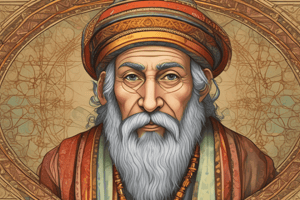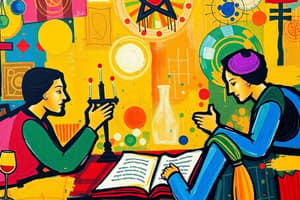Podcast
Questions and Answers
Qual è il termine che si riferisce alle pratiche religiose e culturali del popolo ebraico?
Qual è il termine che si riferisce alle pratiche religiose e culturali del popolo ebraico?
Quali sono i tre principali festival conosciuti come 'regalim' nella tradizione ebraica?
Quali sono i tre principali festival conosciuti come 'regalim' nella tradizione ebraica?
Cosa commemora la festa di Sukkot nella tradizione ebraica?
Cosa commemora la festa di Sukkot nella tradizione ebraica?
Quando inizia la festa di Pesach nella tradizione ebraica?
Quando inizia la festa di Pesach nella tradizione ebraica?
Signup and view all the answers
Quale pasto speciale viene partecipato dai fedeli durante Pesach?
Quale pasto speciale viene partecipato dai fedeli durante Pesach?
Signup and view all the answers
Quali sono i cinque libri considerati i testi più sacri dell'ebraismo?
Quali sono i cinque libri considerati i testi più sacri dell'ebraismo?
Signup and view all the answers
Cosa si celebra durante Shavuot?
Cosa si celebra durante Shavuot?
Signup and view all the answers
Durante Shavuot, quali cibi vengono consumati?
Durante Shavuot, quali cibi vengono consumati?
Signup and view all the answers
Quale libro viene letto durante Shavuot?
Quale libro viene letto durante Shavuot?
Signup and view all the answers
Quale periodo storico è caratterizzato dall'unità sotto i re Saul, Davide e Salomone?
Quale periodo storico è caratterizzato dall'unità sotto i re Saul, Davide e Salomone?
Signup and view all the answers
Qual è il significato simbolico dell'abbigliamento bianco durante Shavuot?
Qual è il significato simbolico dell'abbigliamento bianco durante Shavuot?
Signup and view all the answers
Qual è lo scopo principale del Talmud?
Qual è lo scopo principale del Talmud?
Signup and view all the answers
Quale evento storico ha portato a un impegno rinnovato verso l'identità ebraica?
Quale evento storico ha portato a un impegno rinnovato verso l'identità ebraica?
Signup and view all the answers
Qual è il contenuto principale della Mishnah nel Talmud?
Qual è il contenuto principale della Mishnah nel Talmud?
Signup and view all the answers
Chi guidò gli Israeliti fuori dall'Egitto secondo la storia ebraica?
Chi guidò gli Israeliti fuori dall'Egitto secondo la storia ebraica?
Signup and view all the answers
Qual è uno dei periodi storici segnati dalla conquista romana e dalla rivolta di Bar Kokhba?
Qual è uno dei periodi storici segnati dalla conquista romana e dalla rivolta di Bar Kokhba?
Signup and view all the answers
Study Notes
Ebraismo: An Exploration of Jewish Traditions and History
Ebraismo, derived from the term "Ebreo," refers to the religious and cultural practices of the Jewish people. The core of Jewish spiritual and religious tradition is the Torah, a set of teachings that are explicitly self-positioned as divine revelations. The Torah includes the five books of Moses, which are considered the most sacred texts in Judaism. These books provide guidance, wisdom, and moral values for the Jewish people.
Jewish Holidays
Jewish holidays are an essential part of the Jewish calendar, and they celebrate various events in Jewish history and tradition. The three major festivals, known as "regalim," are Sukkot, Passover, and Shavuot:
-
Sukkot: Also called the Festival of Booths or Tabernacles, Sukkot commemorates the Israelites' forty years of wandering in the desert after the Exodus from Egypt. It is a week-long holiday during which Jews build temporary booths or huts to symbolize the Israelites' dwelling in the wilderness.
-
Passover: Pesach, or Passover, is a week-long holiday that begins on the evening of the 14th day of Nisan. It commemorates the Israelites' liberation from slavery in ancient Egypt. During Passover, Jews partake in a special meal called the Seder, which includes symbols of the Israelites' journey and their freedom from Egypt.
-
Shavuot: Also known as the Festival of Weeks or Pentecost, Shavuot celebrates the revelation of the Torah to the Israelites. It coincides with the wheat harvest and includes all-night study marathons, eating dairy foods, reading the Book of Ruth, decorating homes and synagogues with greenery, and wearing white clothing, symbolizing purity.
Jewish History
Jewish history is rich and complex, spanning thousands of years. Key events and periods include:
-
Exodus from Egypt: The Israelites, led by Moses, were enslaved in ancient Egypt. Moses, through divine intervention, led the Israelites out of Egypt and received the Ten Commandments from God at Mount Sinai.
-
Period of the Judges: After Moses' death, Israel was ruled by a succession of judges. However, the Israelites frequently turned to idolatry and faced consequences for their disobedience.
-
Unification and Monarchy: Israel was eventually united under Kings Saul, David, and Solomon. However, the kingdom was later divided into the northern kingdom of Israel and the southern kingdom of Judah.
-
Exile and Return: The Israelites were exiled from their homeland by the Assyrians and Babylonians due to their disobedience and idolatry. They eventually returned to Israel, but their devotion to God remained inconsistent.
-
Roman Rule: The Romans conquered the region of Judea and forced the Jews into exile. This period was marked by the Bar Kokhba Revolt, which fought against Roman rule and the suppression of Jewish practices.
-
Modern Times: In the 20th century, Jews were granted Roman citizenship, and Judaism was recognized as a legitimate religion. The Holocaust during World War II led to the deaths of millions of Jews, but it also resulted in a renewed commitment to Jewish identity and the establishment of the State of Israel.
Talmud
The Talmud is a collection of Jewish religious texts and commentaries that interpret and explain the Torah. It consists of the Mishnah, which is a compilation of Jewish laws and teachings, and the Talmud, which includes discussions and debates among Jewish scholars. The Talmud serves as a guide to the interpretation of the Torah and provides valuable insights into Jewish beliefs and practices.
In conclusion, Ebraismo encompasses the rich history, traditions, and religious practices of the Jewish people. The Torah, Jewish holidays, and the Talmud are central to Jewish life and beliefs, providing guidance, wisdom, and moral values for the Jewish community.
Studying That Suits You
Use AI to generate personalized quizzes and flashcards to suit your learning preferences.
Description
Test your knowledge of Jewish traditions, history, and religious practices with this quiz. Explore the significance of the Torah, major Jewish holidays, key events in Jewish history, and the role of the Talmud. From Sukkot to the Roman Rule and the establishment of the State of Israel, delve into the diverse aspects of Ebraismo.




